牛津译林版英语六年级下册全册复习资料
小学英语六年级下学期(牛津译林版)Unit 3-4复习资料
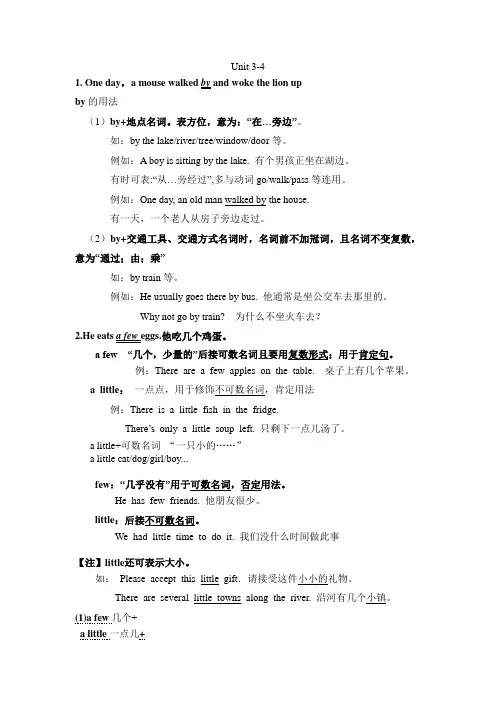
Unit 3-41. One day,a mouse walked by and woke the lion upby的用法(1)by+地点名词。
表方位,意为:“在…旁边”。
如:by the lake/river/tree/window/door等。
例如:A boy is sitting by the lake. 有个男孩正坐在湖边。
有时可表:“从…旁经过”,多与动词go/walk/pass等连用。
例如:One day, an old man walked by the house.有一天,一个老人从房子旁边走过。
(2)by+交通工具、交通方式名词时,名词前不加冠词,且名词不变复数,意为“通过;由;乘”如:by train等。
例如:He usually goes there by bus. 他通常是坐公交车去那里的。
Why not go by train? 为什么不坐火车去?2.He eats a few eggs.他吃几个鸡蛋。
a few “几个,少量的”后接可数名词且要用复数形式;用于肯定句。
例:There are a few apples on the table. 桌子上有几个苹果。
a little:一点点,用于修饰不可数名词,肯定用法例:There is a little fish in the fridge.There’s only a little soup left. 只剩下一点儿汤了。
a little+可数名词“一只小的……”a little cat/dog/girl/boy...few:“几乎没有”用于可数名词,否定用法。
He has few friends. 他朋友很少。
little:后接不可数名词。
We had little time to do it. 我们没什么时间做此事【注】little还可表示大小。
如:Please accept this little gift.请接受这件小小的礼物。
译林版 六年级下英语全册重点复习
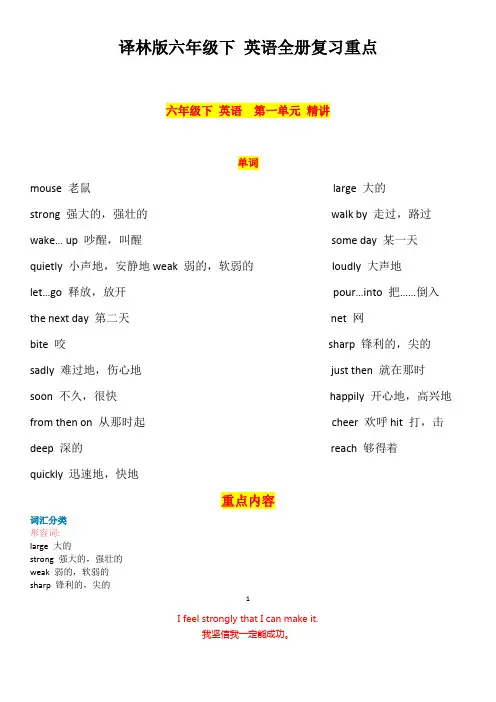
六年级下英语第一单元精讲单词mouse 老鼠large 大的strong 强大的,强壮的walk by 走过,路过wake… up 吵醒,叫醒some day 某一天quietly 小声地,安静地 weak 弱的,软弱的loudly 大声地let…go 释放,放开pour…into 把……倒入the next day 第二天 net 网bite 咬sharp 锋利的,尖的sadly 难过地,伤心地just then 就在那时soon 不久,很快 happily 开心地,高兴地from then on 从那时起cheer 欢呼 hit 打,击deep 深的 reach 够得着quickly 迅速地,快地重点内容词汇分类形容词:large 大的strong 强大的,强壮的weak 弱的,软弱的sharp 锋利的,尖的1I feel strongly that I can make it.我坚信我一定能成功。
deep 深的副词:quietly 小声地,安静地loudly大声地sadly难过地,伤心地happily开心地,高兴地quickly迅速地,快地soon 不久,很快动词:bite 咬cheer 欢呼hit 打,击reach 够得着名词:mouse 老鼠net 网短语1. walk by 走过,路过2. wake... up 吵醒,叫醒3. eat the mouse 吃这只老鼠4.be good at 擅长5. let... go 释放,放开6. pour... into 把...倒人7. in the forest 在森林里8. some day 某一天9. become friends 成了朋友10. the next day 第二天11. just then 就在那时12. from then on 从那时起13. make a big hole 弄一个大洞14. so small and weak 这么弱小15. very large and strong 非常大并且强壮惯用表达式1. How can you help me? 你能怎么帮助我?2. Thank you! 谢谢你!2I feel strongly that I can make it.我坚信我一定能成功。
完整word版新版译林英语六年级下册知识点整理
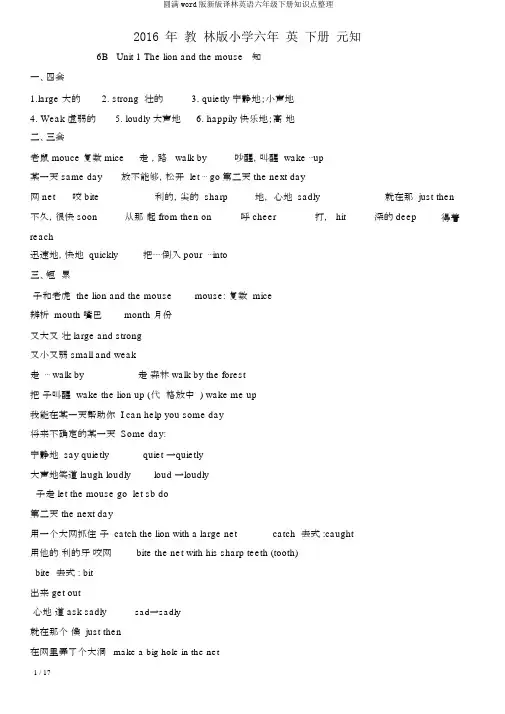
2016 年教林版小学六年英下册元知6B Unit 1 The lion and the mouse知一、四会rge 大的2. strong 壮的3. quietly 宁静地;小声地4. Weak 虚弱的5. loudly 大声地6. happily 快乐地;高地二、三会老鼠 mouce 复数 mice 走,路 walk by 吵醒,叫醒 wake ⋯up某一天 same day 放不能够,松开 let ⋯ go第二天 the next day网 net 咬 bite 利的,尖的 sharp 地,心地 sadly 就在那 just then 不久,很快 soon 从那起 from then on 呼 cheer 打, hit 深的 deep 得着reach迅速地,快地 quickly 把⋯⋯倒入 pour ⋯into三、短累子和老虎 the lion and the mouse mouse: 复数 mice辨析 mouth 嘴巴month 月份又大又壮 large and strong又小又弱 small and weak走⋯ walk by 走森林 walk by the forest把子叫醒 wake the lion up (代格放中 ) wake me up我能在某一天帮助你 I can help you some day将来不确定的某一天 Some day:宁静地 say quietly quiet →quietly大声地笑道 laugh loudly loud →loudly子走 let the mouse go let sb do第二天 the next day用一个大网抓住子 catch the lion with a large net catch 去式 :caught用他的利的牙咬网bite the net with his sharp teeth (tooth)bite 去式 : bit出来 get out心地道 ask sadly sad→sadly就在那个候 just then快乐地 say happily happy→happily从那起 from then on成好朋友 become good friends become +形容得怎样⋯糖果店 sweet shop一个棒棒糖 a lollipop他会什么 ? what will he say?没关系 It doesn ’t matter.伊索寓言 Aesop’s Fables一本中文成 a Chinese idiom book快乐地打 play table tennis happily擅 be good at+名 // be good at +ing大声地他呼cheer for them loudly cheer for ⋯ 呼球用力 hit the ball hard hit 打,(去式 : hit):最后 finally近意: at last太深too deep我不到 I can ’t reach it reach 到达reach my school迅速地拿一些水来bring some water quickly把它倒洞里 pour it in the hole干得好! Well done 四、四会句子The mouce said quietly. 老鼠小声地。
牛津译林小学六年级英语毕业复习资料
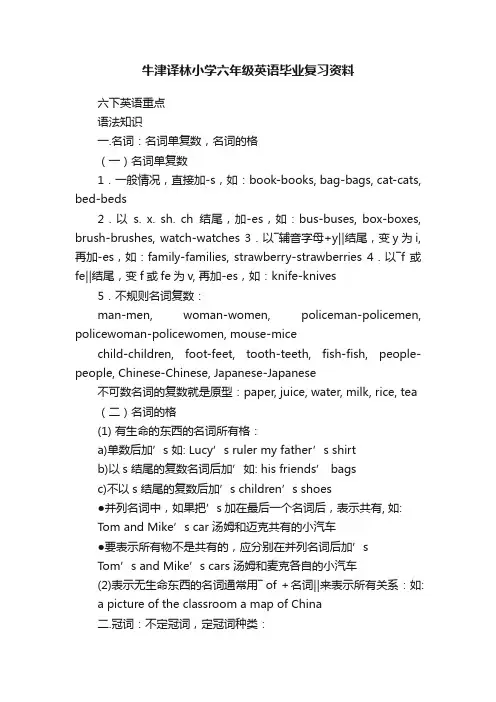
牛津译林小学六年级英语毕业复习资料六下英语重点语法知识一.名词:名词单复数,名词的格(一)名词单复数1.一般情况,直接加-s,如:book-books, bag-bags, cat-cats, bed-beds2.以s. x. sh. ch结尾,加-es,如:bus-buses, box-boxes, brush-brushes, watch-watches 3.以―辅音字母+y‖结尾,变y为i, 再加-es,如:family-families, strawberry-strawberries 4.以―f或fe‖结尾,变f或fe为v, 再加-es,如:knife-knives5.不规则名词复数:man-men, woman-women, policeman-policemen, policewoman-policewomen, mouse-micechild-children, foot-feet, tooth-teeth, fish-fish, people-people, Chinese-Chinese, Japanese-Japanese不可数名词的复数就是原型:paper, juice, water, milk, rice, tea (二)名词的格(1) 有生命的东西的名词所有格:a)单数后加’s 如: Lucy’s ruler my father’s shirtb)以s 结尾的复数名词后加’如: his friends’ bagsc)不以s 结尾的复数后加’s children’s shoes●并列名词中,如果把’s加在最后一个名词后,表示共有, 如:Tom and Mike’s car 汤姆和迈克共有的小汽车●要表示所有物不是共有的,应分别在并列名词后加’sTom’s and Mike’s cars 汤姆和麦克各自的小汽车(2)表示无生命东西的名词通常用― of +名词‖来表示所有关系:如:a picture of the classroom a map of China二.冠词:不定冠词,定冠词种类:(1)不定冠词:a / an a unit / an uncle第1 页共7 页成长在线成就的是幸福快乐成功的人生!。
译林版六年级下册英语所有单元复习资料
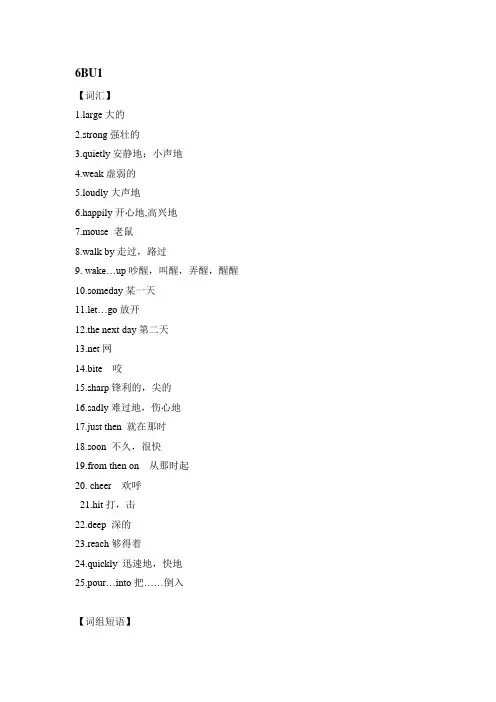
6BU1【词汇】rge大的2.strong强壮的3.quietly安静地;小声地4.weak虚弱的5.loudly大声地6.happily开心地,高兴地7.mouse 老鼠8.walk by走过,路过9. wake…up吵醒,叫醒,弄醒,醒醒10.someday某一天11.let…go放开12.the next day第二天网14.bite 咬15.sharp锋利的,尖的16.sadly难过地,伤心地17.just then 就在那时18.soon 不久,很快19.from then on 从那时起20. cheer 欢呼21.hit打,击22.deep 深的23.reach够得着24.quickly 迅速地,快地25.pour…into把……倒入【词组短语】狮子和老虎the lion and the mouse又大又强壮large and strong又小又弱small and weak走过… walk by走过森林walk by the forest把狮子叫醒wake the lion up wake me(代词宾格放中间)up我能在某一天帮助你I can help you some day将来不确定的某一天some day安静地说say quietly大声地笑道laugh loudly让狮子走let the mouse go第二天the next day用一个大网抓住狮子catch the lion with a large net用他的锋利的牙齿咬网bite the net with his sharp teeth 出来get out 伤心地问道ask sadly就在那个时候just then在网里弄了个大洞make a big hole in the net开心地说say happily从那时起from then on成为好朋友become good friends糖果店sweet shop一个棒棒糖a lollipop他会说什么what will he say没关系It doesn’t matter.伊索寓言Aesop’s Fables一本中文成语书a Chinese idiom book开心地打乒乓play table tennis happily擅长be good at+名词/ be good at+doing大声地为他们欢呼cheer for them loudly击球用力hit the ball hard最后finally太深too deep我够不到I can’t reach it迅速地拿一些水来bring some water quickly把它倒进洞里pour it in the hole干得好!Well done!【句型】1.The mouse said quietly. 老鼠小声地说。
译林英语六年级下册毕业复习资料
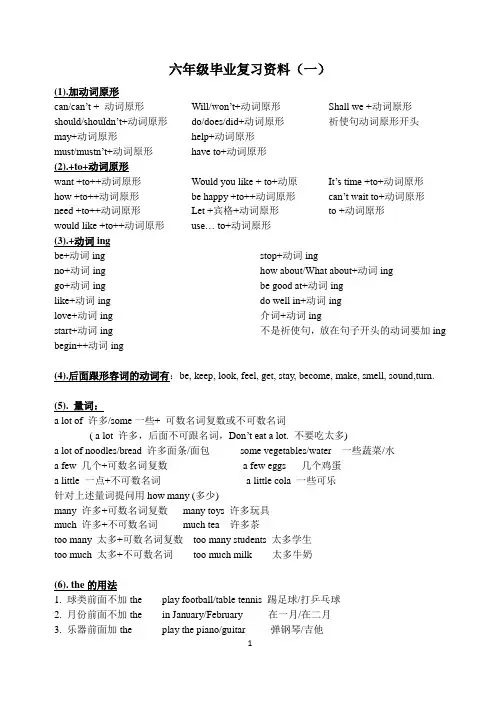
六年级毕业复习资料(一)(1).加动词原形can/can’t + 动词原形should/shouldn’t+动词原形may+动词原形must/mustn’t+动词原形Will/won’t+动词原形do/does/did+动词原形help+动词原形have to+动词原形Shall we +动词原形祈使句动词原形开头(2).+to+动词原形want +to++动词原形how +to++动词原形need +to++动词原形would like +to++动词原形Would you like + to+动原be happy +to++动词原形Let +宾格+动词原形use… to+动词原形It’s time +to+动词原形can’t wait to+动词原形to +动词原形(3).+动词ingbe+动词ingno+动词inggo+动词ing like+动词ing love+动词ing start+动词ing begin++动词ing stop+动词inghow about/What about+动词ingbe good at+动词ingdo well in+动词ing介词+动词ing不是祈使句,放在句子开头的动词要加ing(4).后面跟形容词的动词有:be, keep, look, feel, get, stay, become, make, smell, sound,turn.(5). 量词:a lot of 许多/some一些+ 可数名词复数或不可数名词( a lot 许多,后面不可跟名词,Don’t eat a lot. 不要吃太多)a lot of noodles/bread 许多面条/面包some vegetables/water 一些蔬菜/水a few 几个+可数名词复数 a few eggs 几个鸡蛋a little 一点+不可数名词 a little cola 一些可乐针对上述量词提问用how many (多少)many 许多+可数名词复数many toys 许多玩具much 许多+不可数名词much tea 许多茶too many 太多+可数名词复数too many students 太多学生too much 太多+不可数名词too much milk 太多牛奶(6). the的用法1. 球类前面不加the play football/table tennis 踢足球/打乒乓球2. 月份前面不加the in January/February 在一月/在二月3. 乐器前面加the play the piano/guitar 弹钢琴/吉他4. 四个传统节日加the the Spring Festival 春节Dragon Boat Festival 端午节Mid-Autumn Festival 中秋节Double Ninth Festival 重阳节5. holiday 前加the the National Day holiday 国庆节(on holiday 度假中,没有the )6. 景点前加the the Bund (上海)外滩the Shanghai Museum 上海博物馆the Great Wall 长城the Palace Museum 故宫the Summer Palace 颐和园(Tian’anmen Square 前面不加the)7. 序数词前加the on the second floor 在二楼the third girl第三个女孩日期:the +序数词+of +月份8. 其他the next day 第二天(7)in 的用法1. 在…里/上in the kitchen 在厨房in the forest 在森林里in the playground 在操场上in the tree 在树上(指不长在树上) the apples on the tree 树上的苹果on the tree 在树上(指长在树上的) the monkeys on the tree 树上的猴子2. 时间in the morning/afternoon/evening 在早上/下午/晚上in May / June 在五月/六月in three days 三天内in the future 在将来/未来3. 其它in a healthy diet 在健康的饮食in your meals 在你的餐点中go in 进入in front of 在…前面(方位上的) before 在……之前(时间上的) in front of the house 房子前面before bedtime 睡前(8)on的用法1. 某一天前用on1) on Monday/Tuesday/Wednesday/Thursday 在周一/周二/周三/周四2) on the second of March 在三月二日3) on Mother’s Day 在母亲节4) on your birthday 在你生日2. 某一天的早中晚on Friday morning在周五早上on Saturday afternoon在周六下午on Sunday evening在周日晚上on Chinese New Year’s Eve 在除夕夜3. 其它on your left/right 在你左边/右边put on 穿上(take off 脱下)put on a play 上演/表演一出戏try on 试穿get on 上车(get off下车)from then on 从那时起go on 继续(go well 进展顺利)(9)at的用法1.时间at eleven (o’clock) 在十一点at night 在夜里at weekends 在周末at a time 一次at Christmas 在圣诞节at Chinese New Year 在中国新年at this festival 在这个节日at first 起先,最初at last 最后2. 地点at school 在学校at home 在家at Mike’s house 在麦克家at the party 在派对at a snack bar 在小吃店at a shopping centre 在购物中心at Park Station 在公园站at the train station 在火车站at the bus stop在公交车站at the traffic lights 在交通信号灯处at the school gate 在校门口3. 其它point at…指着,指向point at the king 指着国王laugh at 笑,大笑(laughed过去式) laugh at me 笑我shout at 朝……喊shout at that old man 朝那个老人喊(10)V. sb. sth.=V. sth. to sb.1. show sb. sth. = show sth. to sb. 给某人看某物/向某人展示某物show me your new clothes=show your new clothes to me 为我看你的新衣服2. give sb. sth. =give sth. to sb. 给某人某物/把某物给某人give him a book = give a book to him 给他一本书/把一本书给他3. send an email to her = send her an email 给她发封邮件/发封邮件给她4. write letters to them = write them letters 给他们写信/写信给他们(11)句型What ….? 询问什么,用具体的事情回答。
2020年牛津译林版六年级英语下册全册复习资料
6A知识点大纲Unit 1 The lion and the mouse 单词quietly 安静地sadly难过地,伤心地happily开心地,高兴得some day某一天loudly 大声地quickly迅速地,快地wake ... up吵醒,叫醒soon不久,很快large 大的weak弱的,软弱的strong强大的,强壮的cheer欢呼deep 深的sharp锋利的,尖的let ... go释放,放开just then就在那时mouse 老鼠walk by走过,路过from then on从那时起bite咬net 网pour ... into把……倒入hit打,击the next day第二天重点词组1. in the forest 在森林里2. walk by 走过;路过3. wake up 醒,醒来4. wake sb. up 把某人叫醒5. be angry with sb. 对某人生气6. the next day 第二天7. be angry at sth. 对某事生气8. want to do sth. 想要做某事9. want sb. to do sth. 要某人做某事10. some day 某一天11. say quietly 小声地说12. sit quietly 静静地坐着13. laugh loudly 大声地笑14. let sb. do sth. 让某人做某事15. catch the lion with a large net 用一口大网捉住狮子16. bite the net with sharp teeth 用锋利的牙齿咬网17. ask sadly 难过地问,伤心地问18. just then 就在那时19. say happily 开心地说20. from then on 从那时起21. become friends 成为朋友22. say excitedly 兴奋地说,激动地说23. make a study plan 制定学习计划24. It doesn’t matter. 没关系。
牛津译林版英语六年级下册期末知识点复习(一般过去时和一般将来时)附练习含答案
六年级下学期知识点预习【重点语法:一般过去时和一般将来时】一般过去时一.时态含义:表示过去某个时间发生的动作。
二.时态标志:yesterday昨天,last week/year…上周/去年…(last上一个),just now刚才,this morning/afternoon,…ago等四种时间状语①yesterday及相关短语。
例如:yesterday morning/afternoon/evening昨天上午/下午/晚上②“last+时间状语”构成的短语。
例如:last night/month/spring/year昨晚/上个月/去年春天/去年③“一段时间+ago”组成的短语。
例如:three days ago三天以前four years ago四年以前④“介词+时间名词”组成的短语。
例如:in1999在1999年on the morning of December25th在12月25号早上三.动词过去式动词在过去时态中,要由原形变化成为过去式,其变化规则为以下几种(1)be动词am/is--was are--were(2)直接在动词后面加ed laugh--laughed point--pointed(3)以不发音的e结尾的加d like--liked live--lived(4)以辅音+y结尾的try--tried cry--cried要去掉y改成i加ed carry--carried(5)以元音+y结尾的加ed play--played stay--stayed(6)有些动词要双写最后一个字母,再加ed stop—stopped jog—jogged(7)不规则变化(为过去时态中变化的难点,也是考试的重点)原形过去式原形过去式原形过去式do did go went say saidtell told can could get got have had give gave see saw become became fly flew bring brought eat ate take took find found lose lost stop stopped sing sang make made run ran swim swam hold held come came catch caught wear wore read read draw drew write wrote buy bought mean meant drink drank smell smelt keep kept put put throw threw slip slipped feel felt cut cut drive drove四.结构1.肯定句:主语+动词过去式2.一般疑问句:(1)句中含有be动词,将be动词提到句首,Was/Were+主语+……?Yes,…was/were./No,…wasn’t/weren’t.(2)句中无be动词,在句首加Did,动词变原形,Did+主语+动词原形……?Yes,…did./No,…didn’t.3.否定句的修改方法(1)句中含有be动词,直接在be动词后面加not,主语+wasn’t/weren’t…(2)句中无be动词,在动词前加didn’t,动词变原形,主语+didn’t+动词原形4.特殊疑问句:What did+主语+do?一般过去时练习一、请用正确动词形式填空。
牛津译林版六年级英语下册6B U1-U3单元重点知识总结
6B U1-U3单元重点知识总结Unit 1 Cinderella一、单词。
prince王子 because因为 before 在…以前 late迟的,晚的fairy 仙女 clothes 衣服 fit合适,合身 pick 摘,拾why 为什么 let让 mushroom 蘑菇 understand明白,理解二、词组。
1. at the prince’s house -在王子家2. come and help me -过来帮助我3. my gloves /trousers/T-shirt -我的手套/裤子/T恤衫4. go to the party -去参加聚会5. put on -穿上(衣服)6. try on -试穿7. take off -脱下8. be bad for… -对…有害9. take it off -脱下它10. put them on -穿上它们11. try on the shoe -试穿这只鞋12. try them on -试穿它们13. come back before 12 o’clock-十二点之前回来14. be sad /happy -伤心/开心15. have a good/great time -玩得开心16. at the party -在聚会上17. have to do sth. -不得不做某事18. have to come home -不得不回家19. visit every house -拜访每一户20. fit sb well -很适合某人21. at 12 o’clock -在十二点22. put on the English play -表演(演出)这个英语剧23. have a drink -喝饮料24. draw a dress for her friend -为她的朋友画一件连衣裙25. read stories -读故事26. have some snacks -有一些零食27. at a snack bar -在零食店28. thirsty and hungry Bobby -饥渴交加的波比29. in the forest -在森林里30. find some mushrooms -发现一些蘑菇31. under the tree -在树下32. pick a big red mushroom -摘了一个又大又红的蘑菇33. pick up the book =pick the book up-捡起这本书34. pick them up -把它们捡起来35. leave a shoe behind -把一只鞋子留下了36. don’t understand why -不明白为什么37. foot hurts -脚疼38. be bad /good for… -对…有坏处/好处39. have to -不得不,必须40. leave…behind -留下;丢下41. have some nice clothes and shoes -有些漂亮衣服和鞋子42. don’t have any nice clothes or shoes -没有漂亮衣服和鞋子43. put on the new clothes= put the new clothes on-穿上新衣服44. take off his white jacket=take his white jacket off -脱下他白色的夹克衫三、句型。
译林牛津英语六年级下册第一单元知识点复习与习题.doc
6下Unit 1 The lion and the mouse知识点梳理一词组1. in the forest 在森林里2. walk by 走过;路过3. wake up 醒,醒来4. wake sb up 把某人叫醒5. be angry with sb 对某人生气6. the next day 第二天7. be angry at sth 对某事生气8. want to do sth 想要做某事9. want sb to do sth 要某人做某事10. some day 某一天11. say quietly 小声地说 12. sit quietly 静静地坐着13. laugh loudly 大声地笑14. let sb do sth 让某人做某事15. catch the lion with large net 用一口大网捉住狮子16. bite the net with sharp teeth 用锋利的牙齿咬网17. ask sadly 难过地问,伤心地问18. just then 就在那时19. say happily 开心地说,20. from then on 从那时起21. become friends 成为朋友22. say excitedly 兴奋地说,激动地说23. make a study plan 制定学习计划24. It doesn’t matter. 没关系。
25. the boy over there 那边的那个男孩26. play table tennis happily 开心地打乒乓球27. cheer for sb loudly 大声地为某人欢呼28. be excited at / about… 对……很兴奋// 激动29. in the ground 在地下 30. reach the apple 够得着那个苹果31. reach the park 到达公园32. have an idea 有一个主意33. bring some water quickly 很快拿来水34. pour…into….把……倒入……35. Well done. 干得很好。
- 1、下载文档前请自行甄别文档内容的完整性,平台不提供额外的编辑、内容补充、找答案等附加服务。
- 2、"仅部分预览"的文档,不可在线预览部分如存在完整性等问题,可反馈申请退款(可完整预览的文档不适用该条件!)。
- 3、如文档侵犯您的权益,请联系客服反馈,我们会尽快为您处理(人工客服工作时间:9:00-18:30)。
6A知识点大纲Unit 1 The lion and the mouse 单词quietly 安静地sadly难过地,伤心地happily开心地,高兴得some day某一天loudly 大声地quickly迅速地,快地wake ... up吵醒,叫醒soon不久,很快large 大的weak弱的,软弱的strong强大的,强壮的cheer欢呼deep 深的sharp锋利的,尖的let ... go释放,放开just then就在那时mouse 老鼠walk by走过,路过from then on从那时起bite咬net 网pour ... into把……倒入hit打,击the next day第二天重点词组1. in the forest 在森林里2. walk by 走过;路过3. wake up 醒,醒来4. wake sb. up 把某人叫醒5. be angry with sb. 对某人生气6. the next day 第二天7. be angry at sth. 对某事生气8. want to do sth. 想要做某事9. want sb. to do sth. 要某人做某事10. some day 某一天11. say quietly 小声地说12. sit quietly 静静地坐着13. laugh loudly 大声地笑14. let sb. do sth. 让某人做某事15. catch the lion with a large net 用一口大网捉住狮子16. bite the net with sharp teeth 用锋利的牙齿咬网17. ask sadly 难过地问,伤心地问18. just then 就在那时19. say happily 开心地说20. from then on 从那时起21. become friends 成为朋友22. say excitedly 兴奋地说,激动地说23. make a study plan 制定学习计划24. It doesn’t matter. 没关系。
25. the boy over there 那边的那个男孩26. play table tennis happily开心地打乒乓球27. cheer for sb. loudly 大声地为某人欢呼28. be excited at / about…对……很兴奋/激动29. in the ground 在地下30. reach the apple 够得着那个苹果31. reach the park 到达公园32. have an idea 有一个主意33. bring some water quickly很快拿来水34. pour…into….把……倒入……35. Well done. 干得很好。
做的不错。
36. so many balls 如此多的球37. so much bread 如此多的面包38. take … to… 把…….带到…….39. become happy 变得很开心40. get out 出来,出去重点句型1. The lion was angry and wanted to eat the mouse.这只狮子很生气想要吃那只老鼠。
2. The lion bit the net with his sharp teeth.那只狮子用它的厉牙咬那个网。
3. From then on, the lion and the mouse become friends.从那以后,这只狮子和那只老鼠成了朋友。
4. The next day, two men caught the lion with a large net.第二天,两个男人用一张大网抓住了那只狮子。
5. The lion bit the net with his sharp teeth, but that did not help.那只狮子用他的厉牙咬网,但是那无济于事。
6. Here comes the lion.狮子来了。
7. One day, a mouse walked by and woke the lion up.一天,一只老鼠从狮子身边经过,弄醒了狮子。
8. The mouse said quietly. 老鼠小声地说。
9. “How can I get out ?” asked the lion sadly.“ 我怎么能出去呢?”狮子难过地问。
10. Soon, the mouse made a big hole in the net with his teeth.很快,老鼠用他的牙齿把网咬了一个大洞。
语法1、常见副词well: study well学习好 skate well滑冰好(注: well 若表示形容词,则意思为身体好)fast: run fast 跑得快 swim fast游泳快loudly: laugh loudly 大声得笑 speak loudly 大声地讲sadly: ask sadly 伤心地问 cry loudly 伤心地哭happily: sing happily 开心地唱 talk happily 开心的谈话carefully: listen carefully 认真地听 walk carefully 小心地走angrily: ask angrily 愤怒地问quietly: do one’s homework quietly安静地做作业sleep quietly 安静地睡quickly: bring some water quickly 迅速地拿些水来beautifully: dance beautifully 唱歌唱得美★系表结构: (注意不用副词)be, feel, look, sound, smell, become, keep + 形容词★fast ,hard ,high,early,late, 形容和副词同形2、一般过去式常用的时间状语ago / long long ago / yesterday / the day before yesterday in 2014 / just now(刚才) /at the age of 5(在五岁时) / once upon a time从前 / one day / last week, year, night, month, from then on3、speak ,talk,say,tell区别speak强调方式;say强调内容;tell后一定要加人或讲的内容; talk强调连续说Unit 2 Good habit单词late 迟,晚tidy干净的,整齐的bad不好的,坏的last night昨夜sleepy困的,困倦的finish完成go into走进,走入never从不fast 快地slowly慢速地badly差地,不好habit习惯put ... in order把……整理得井井有条重点词组1. many good habits 很多好习惯2. get up early 早起3. go to bed late 晚睡4. brush one’s teeth 刷牙5. put sth. in order 把东西摆放有序6. finish one’s homework完成家庭作业7. listen to the teacher 听老师的话 8. at school 在学校9. keep the room clean and tidy 保持房间干净整洁10. do well 干得好 11. some bad habits 一些坏习惯12. feel sleepy 感到困倦 13. know sb. well 对某人很了解14. walk fast 快速地走 15. Pick one! 选一个16. show sb. around sp. 带某人参观某地 17. go into 进入重点句型语法 副词的分类(1) 时间副词:常见的有now, then, soon, ago, lately, later, before, early, today, tomorrow, yesterday, tonight, suddenly, still, already, just 等。
(2) 地点副词:常见的有here, there, up, down, away, nearby, home, upstairs, downstairs 等。
(3) 方式副词:表示行为方式的副词大多以-ly 结尾,常见的有quietly, heavily, warmly, carefully, happily, angrily 等。
(4) 频度副词:常见的有always, usually, often, sometimes, never 等。
(5) 程度副词:常见的有very, much, too, greatly, really 等。
如:(6) 焦点副词:就是通过强调使之成为人们注意的焦点的副词,常见的有:only, also, just, especially, too,等。
(7) 疑问副词:就是用于引出特殊疑问句的when, where, why, how 等。
副词的顺序1. He has many good habits. 他有许多好习惯。
2. He gets up early in the morning and never goes to bed late.他早上早起,从不晚睡。
3. He brushes his teeth in the morning and before bedtime. 他早上和睡前刷牙。
4. At home, Wang Bing always puts his things in order.在家,王兵总是把他的东西摆放有序。
5. He usually finishes his homework before dinner. 他经常在晚餐前晚餐作业。
6. He listens to his teachers at school. 他在学校听老师们的话。
7. He also does well at home. 他在家也做得很好。
8. He keeps his room clean and tidy. 他保持他的房间干净和整洁。
9. He also helps his parents. 他也帮他的父母。
10. He often does his homework late at night and does not go to bed early. 他经常晚做作业,晚上不早睡。
